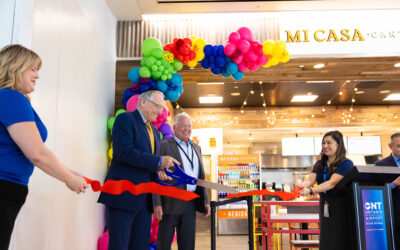
The changeover to new concessionaires at Hartsfield-Jackson Atlanta International (ATL) began Tuesday, May 1 despite controversy surrounding four winning firms.
The Federal Aviation Administration notified ATL on April 20 that four winning firms certified as ACDBEs -Atlanta Restaurant Partners, LLC; Mack II, Inc.; Vida Concessions, Inc.; and Hojeij Branded Foods, Inc – did not actually meet the requirements for ACDBE certification.
The notification prompted an emergency meeting of the Atlanta City Council on Monday. The Council voted 9-2 to continue to the changeover to new concessionaires at ATL, rather than to extend existing contracts for 90 days.
Sonji Jacobs, director of communications for the office of Atlanta Mayor Kasim Reed, says the city believes it proceeded in good faith, given that the companies involved were certified.
“The city’s position is that at the time of the procurement process the companies were certified by the federal government,” Jacobs says. She adds that the city views the four companies as certified still, given that “FAA has not begun a decertification process.”
The airport’s new International Terminal is slated to open May 16. The four firms are among the winners of contracts involving more than 150 concessions both in the International Terminal and throughout the airport complex. Together, the four firms are involved in eight of the nine airport restaurant contracts, helping the city to meet its stated goal of 36% disadvantaged business participation.
In an analysis of city documents, The Atlanta Journal-Constitution found that many of the new contracts would fall below the 36% threshold without participation from any of the four firms.
FAA Concerns
FAA sent letters to ATL aviation general manager Louis Miller, and to Adam Smith, the chief procurement officer for the City of Atlanta, regarding the inaccurate certification of the four concessionaires. The identical letters stated that after review of the certification files of the four firms, it concluded that the firms are ineligible for ACDBE status. The firms were certified by the Georgia Department of Transportation (GDOT) with support from the Metropolitan Atlanta Rapid Transit Authority (MARTA).
“The FAA’s review of certification files and discussions with GDOT staff identified ACDBE certified firms that had PNW [personal net worth] in excess of $750,000 at the time of application,” the FAA letter stated. “Based on the current regulations regarding PNW, certain firms were ineligible to be ACDBE certified. We also have identified additional issues, primarily related to insufficient documentation, that may affect the certification eligibility of these firms.”
Letters outlining the concerns have also been sent from FAA to GDOT and MARTA. In those letters, FAA specified concerns about the certification of each company. In summary, FAA contends that Atlanta Restaurant Partners and Mack II should not have qualified because they exceeded the $750,000 personal net worth cap. Vida Concessions and Hojeij Branded Foods had inadequate documentation. FAA also expressed concern about Vida Concessions’ relationship with Hojeij Branded Foods, and noted that “both the independence of [Vida Concessions] and control of the firm by the applicant appear to be vague or unsubstantiated.”
FAA says the PNW and documentation issues “made the firms ineligible to be considered as ACDBE certified at the time of contract award, and therefore the firms should not have been given scoring preference or counted toward any ACDBE participation goal that the airport may have had in place for the concessions RFP.”
Rectification
The FAA letter to Miller and Smith said FAA is “available to provide technical assistance to your staff to help them remedy any concession awards that were made” to the firms that are found not to meet ACDBE requirements.
“In the meantime, the Airport and the City of Atlanta should not count participation of any firm that has a PNW in excess of $750,000 or otherwise failed to meet Part 23 requirements towards ACDBE goals,” the letter continued.
Jacobs, from the mayor’s office, says the city has had some initial and very brief phone calls with FAA, and expects more substantive communication in the coming weeks. “FAA has said they’re going to offer technical assistance, so we’re going to work with them to figure out what that technical assistance will be,” she says.
Kathleen Bergen, manager of Atlantic media relations for FAA, declined to answer whether FAA believes the concessions awards to the impacted companies should be rescinded, and declined to outline what FAA would consider to be a compliance plan. “The FAA’s position is clearly stated in the letters,” she said via email. “At this point we can’t go beyond what is documented in the letters.”
Joseph McCoy, a partner in the Chicago law firm of Perkins Coie LLP, which specializes in DBE issues, says the way forward is unclear.
“I think you have different situations,” McCoy says. “If a prime has counted a company as part of their package for ACDBE credit, and if it’s just one or two units out of their entire package, the prime is likely to just [replace] that company with another ACDBE.
“If it’s an ACDBE that was awarded a package, I don’t know what the options are,” he adds.
McCoy says some of the confusion could have stemmed from the fact that the PNW cap for DBE companies (49 CFR Part 26 of U.S. Department of Transportation regulations) was raised to $1.32M in January 2011. While the DOT issued a notice of proposed rulemaking last year to also increase the PNW cap for ACDBE companies (49 CFR Part 23, which is specific to airport concessionaires), the change has not been made.
“Quite frankly, I can see why there was some cloudiness” on the PNW cap, McCoy says. Despite the lack of action on Part 23, everybody was expecting the PNW cap for ACDBE companies to increase to $1.32M as well, he says, and some certifying agencies were already using that threshold.
“I know that for some period of time there were different agencies that were applying the $1.32M cap,” McCoy says.
He says that despite that, companies involved will likely be de-certified, regardless of the time and money they’ve spent engaging as a certified ACDBE company. “By the statute, the net worth cap is $750,000, there is no doubt about that,” McCoy says. “I don’t know that there is any recourse for the companies because, regardless of what someone said or what they thought, the statute has not changed.”





